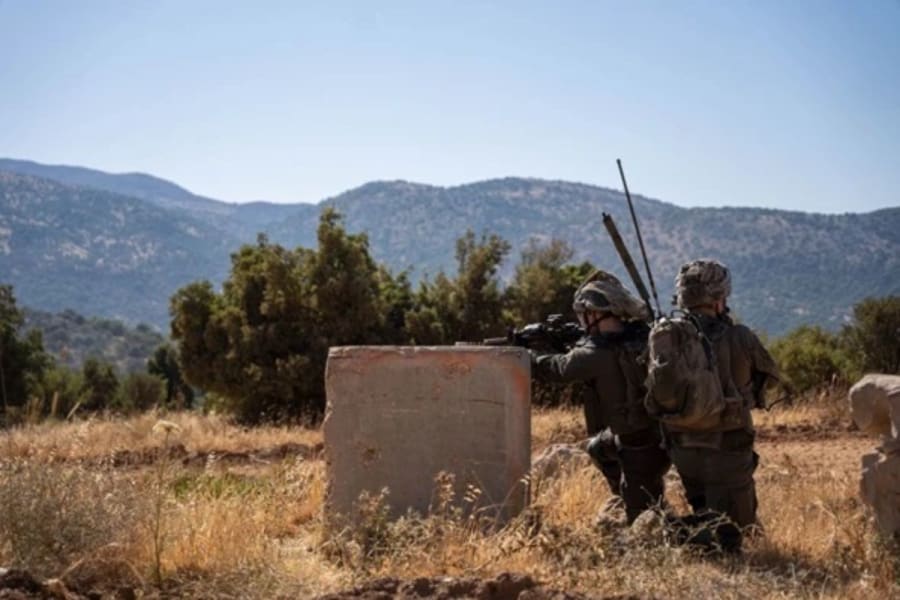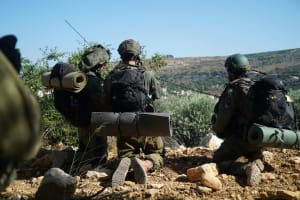IDF North Command trains troops for Lebanon offensive; Israel reportedly strikes in Syria
Multiple nations call on their citizens to leave Lebanon for fear of escalation

Israel Defense Forces continues to train its northern troops for a potential showdown with the Lebanese terror group Hezbollah, which has slightly decreased its near-daily attacks against Israel in recent days.
Israeli media reported that the Security Cabinet would meet Thursday evening to discuss plans regarding the northern border and possible operations against Hezbollah.
The IDF’s Northern Command published footage showing its soldiers during recent exercises that it stated will “increase the readiness and competence of the forces in the northern sector.”
Last week, forces of the 188th Brigade operating in the Mount Dov and Hermon sectors trained in complicated terrain and practiced responding to various threats while closely coordinating the operations of infantry, armor and artillery forces.
בנוסף, ביקר הרמטכ״ל בחטיבת המילואים 228 וקיים הערכת מצב גזרתית ושיח עם מפקדי החטיבה.
— צבא ההגנה לישראל (@idfonline) June 26, 2024
התרגיל החטיבתי התקיים בשיתוף פעולה רב זרועי, במהלכו תרגלו לוחמי צוות הקרב החטיבתי תרחישי קיצון, לחימה בשטח סבוך והררי, הפעלת אש ולחימה בשטח בנוי, כחלק מהגברת המוכנות לצפון pic.twitter.com/x5PaPDeyck
In another exercise by the “Spearhead” 55th Brigade, IDF soldiers reportedly practiced combat scenarios they are likely to encounter in Lebanon, with an emphasis on movement through tangled and overgrown terrain and progression along mountainous paths.
As of Thursday afternoon, Hezbollah had not taken responsibility for any attacks since Wednesday, when the terror group claimed six attacks against Israel. This comes after weeks of massive daily numbers of rocket and drone attacks.
Late on Thursday afternoon, Lebanese media reported an Israeli airstrike on a motorcycle traveling in Sohmour, located in Lebanon’s Western Beqaa District about 20 km (12 miles) from the Israeli border.
On Wednesday afternoon, at least five Hezbollah missiles struck Israel’s northernmost town, Metula, damaging buildings and causing a fire.
Daily update June 27, 2024, 02:30 pm - Northern arenahttps://t.co/bPbJ9JK3Z8 the past 24 hours, #Hezbollah claimed responsibility for six attacks against #Israel using high-trajectory fire, and anti-tank missiles.
— Israel-Alma (@IsraelAlma_org) June 27, 2024
2.Yesterday (June 26), Hezbollah attacked the communities of… pic.twitter.com/drc4LnTX9D
In the evening, a home in Avivim was struck by two missiles within several hours. Another missile attack targeted the community of Even Menachem.
Meanwhile, an Israeli strike on the town of Nabatiyeh was responsible for collapsing a two-story building and wounded five people, according to Lebanese reports. Alma Research Center later said local reports suggested the building belonged to a known Hezbollah-affiliated family in the area.
מטוסי קרב תקפו מוקדם יותר היום מבנה צבאי ועמדת תצפית, לצד תשתית טרור נוספת של ארגון הטרור חיזבאללה במרחבים שובא, עייתא א-שעב ואל-חיאם שבדרום לבנון.
— צבא ההגנה לישראל (@idfonline) June 26, 2024
בנוסף, צה"ל תקף בירי ארטילרי במרחבים שבעא, כפר שובא, כפר חמאם ואל מטמורה שבדרום לבנון pic.twitter.com/t5oJyqMG0X
The IDF also published footage of its strikes on Hezbollah targets in Kfar Shouba, Ayta al-Sha’ab, and Khiam, as well as earlier strikes in Shebaa and Matmoura.
Late on Wednesday evening, Syrian state media claimed the Israeli Air Force (IAF) had launched an attack from above the Golan Heights at targets in Syria, including in the Sayda Zainab District in Damascus.
The area is a stronghold of Iranian forces in Syria and has been struck several times in the past. Two people were reportedly killed in the strikes.
According to local reports, on June 26, during the night, an air attack was carried out on a target in the Sayda Zaynab area, south of Damascus. To our understanding, a compound located about 800 meters northwest of the Sayda Zaynab Mosque site was attacked. It seems that this… pic.twitter.com/gWNqCZQCKL
— Israel-Alma (@Israel_Alma_org) June 27, 2024
Amid the rising tensions between Hezbollah and Israel and fears of what United Nations humanitarian coordinator Martin Griffiths recently called a “potentially apocalyptic” regional war, several countries have demanded their citizens leave Lebanon, while the U.S. called on citizens to “reconsider” traveling there.
As of Thursday, Canada, Kuwait, Holland, Germany, North Macedonia and Russia called their citizens to leave Lebanon immediately.
Behind the scenes, last-ditch diplomatic efforts to avert a broader war continued, despite U.S. envoy Amos Hochstein concluding his latest visit to the region without tangible results.
On Thursday, the Lebanese Al-Akhbar newspaper, seen as having close ties to Hezbollah, reported that a Qatari envoy would soon visit Beirut to discuss the possibility of de-escalation with senior officials of Hezbollah, the Shiite Amal organization, and senior security officials in Lebanon.
The sources emphasized that the Qatari envoy’s visit would be coordinated with the Biden administration, which has led mediation efforts and requested that Qatar assist. The newspaper added that a mid-level Lebanese representative had visited Qatar twice in recent months.
“We have a diplomatic process underway,” a senior Biden administration official told reporters recently. “We’re in fairly intensive consultations with the Israelis, Lebanese and others.”
Senior U.S. officials told The Wall Street Journal they believe that none of the involved parties, including Hezbollah’s backer, Iran, are interested in the war escalating into a regional conflict but fear the ongoing fire exchanges could spiral out of control.
“Given concern about the devastating toll of another Hezbollah-Israel war and the possibility that Iran might join in, the Biden administration is making great diplomatic efforts to defer a conflagration that may ultimately be unavoidable,” David Schenker, former State Department official for the Middle East during the Trump administration, told the WSJ.

The All Israel News Staff is a team of journalists in Israel.
You might also like to read this:













